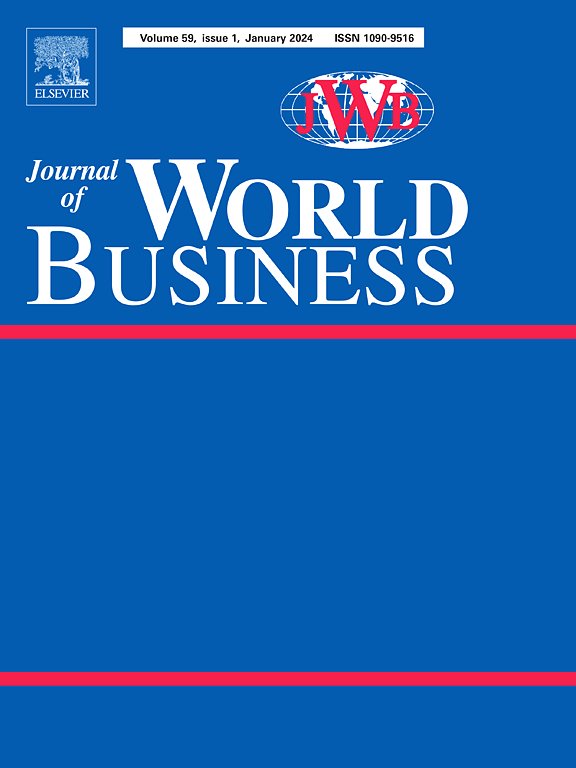Revealing the promise of microfoundations for international business research: A modular approach
IF 8.8
1区 管理学
Q1 BUSINESS
引用次数: 0
Abstract
The microfoundations perspective offers promising avenues for advancing theoretical and empirical research in international business (IB). However, two key challenges have limited progress so far: first, uncovering micro-macro relationships in complex, often nested, IB phenomena; second, applying the multiple theoretical lenses offered by IB to coherently explain relationships. This paper addresses these challenges of applying microfoundations in IB by proposing a modular approach to its foundational framework, Coleman's (1990) bathtub. By breaking down the bathtub into its component parts or modules, each module relates to a specific, independent relationship between two constructs, that can be theorized and tested. We provide clear definitions of how modular (mono, abridged, partial, or full) explanations can be used as a tool for conceptualization and research design. In addition to enhancing our theoretical precision, a modular microfoundations approach also provides the architecture for existing studies to be connectable to new work focusing on other modules. This holds the potential of creating a full microfoundations explanation and thereby a rigorous and cumulative means for theory building in IB. We call for scholars to adopt this modular microfoundations perspective to better tackle the important questions of our time for global business and society.
揭示国际商业研究微观基础的前景:一种模块化方法
微观基础视角为推进国际商务(IB)的理论和实证研究提供了有希望的途径。然而,到目前为止,两个关键挑战限制了进展:首先,揭示复杂的、通常嵌套的IB现象中的微观宏观关系;第二,运用IB提供的多重理论视角来连贯地解释关系。本文通过对其基础框架Coleman(1990)浴缸提出模块化方法,解决了在IB中应用微基础的这些挑战。通过将浴缸分解为其组成部分或模块,每个模块都与两个结构之间的特定独立关系相关,这些关系可以理论化和测试。我们提供了如何模块化(单,精简,部分或全部)解释可以用作概念化和研究设计的工具的明确定义。除了提高我们的理论精度外,模块化微基础方法还为现有研究提供了可连接到其他模块的新工作的架构。这有可能创造一个完整的微基础解释,从而为IB的理论建设提供一个严格和累积的方法。我们呼吁学者采用这种模块化的微基础观点,以更好地解决我们这个时代的全球商业和社会的重要问题。
本文章由计算机程序翻译,如有差异,请以英文原文为准。
求助全文
约1分钟内获得全文
求助全文
来源期刊

Journal of World Business
BUSINESS-
CiteScore
16.50
自引率
11.20%
发文量
73
期刊介绍:
The Journal of World Business holds a distinguished position as a leading publication within the realm of International Business. Rooted in a legacy dating back to 1965, when it was established as the Columbia Journal of World Business, JWB is committed to disseminating cutting-edge research that reflects significant advancements in the field. The journal actively seeks submissions that propel new theoretical frameworks and innovative perspectives on International Business phenomena. Aligned with its domain statement, submissions are expected to possess a clear multinational, cross-border, or international comparative focus, while remaining pertinent to the study of management and organizations. JWB particularly encourages submissions that challenge established theories or assumptions, presenting pioneering or counterintuitive findings. With an inclusive approach, the journal welcomes contributions from diverse conceptual and theoretical traditions, encompassing allied social sciences and behavioral sciences. Submissions should either develop new theories or rigorously test existing ones, employing a variety of qualitative, quantitative, or other methodological approaches. While JWB primarily caters to scholars and researchers, it values contributions that explore implications for Multinational Enterprises and their management, as well as ramifications for public policy and the broader societal role of business.
 求助内容:
求助内容: 应助结果提醒方式:
应助结果提醒方式:


